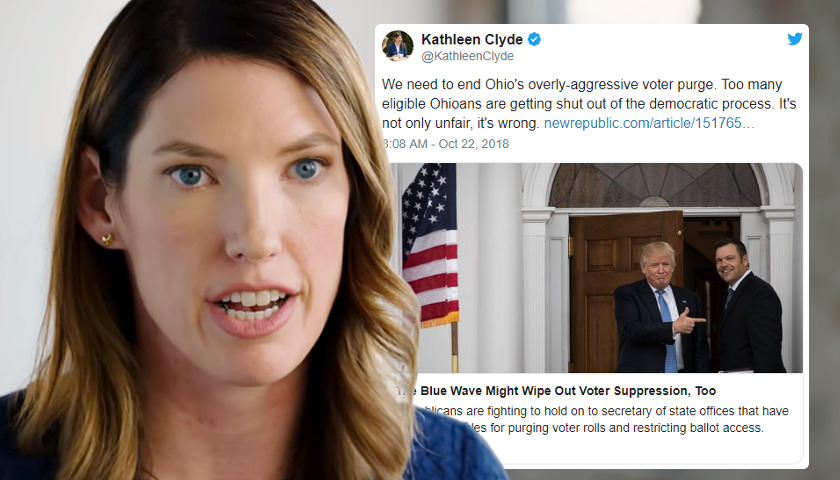Registering to vote was once considered an individual responsibility – part of what it means to be an American citizen doing one’s civic duty.
But that’s changed.
The burden now falls to the state, not individual citizens, to assure that people register and stay eligible to vote. To do anything less brings accusations of “voter suppression” or “rigging the system” in favor of Republicans and President Trump.
Take for example, the argument made by Kathleen Clyde, the Democrat candidate for Ohio secretary of state.
Clyde, 39, a former state legislator of Kent, says Ohio has been “purging” voters from its rolls for years. She wants to make structural changes to the process Republicans put in place to guard against vote fraud. This process includes keeping the state’s voter rolls free of non-citizens as well as citizens who have moved out of district or out of state, or have died. Some long inactive voters, of course, may have simply lost interest in voting for reasons known only to themselves and may wish to stay registered, but the only way to find out is to ask. Ohio sends out notices to inactive voters and asks if they wish to stay on the voting rolls and, if so, to verify their current address. Clyde says that’s wrong.
We need to end Ohio's overly-aggressive voter purge. Too many eligible Ohioans are getting shut out of the democratic process. It's not only unfair, it's wrong. https://t.co/4G9jXJhg8u
— Kathleen Clyde (@KathleenClyde) October 22, 2018
In a radio interview with WKSU, Clyde indicated that, if elected, she will transform Ohio from one of the most strict to one of the most lenient states when it comes to how residents register to vote.
“One way we could do this is move Ohio towards automatic voter registration. Then government and cities are doing the work behind the scenes registering everyone and keeping the rolls up to date,” said Clyde, who is running against Republican Frank LaRose in the Nov. 6 election.
Clyde said her goal is to increase voter participation by maximizing the number of people eligible to vote in Ohio.
In a previous interview, Clyde said she believes Ohio’s voting system is “rigged” against Democrats.
Clyde owes it to Ohio voters to explain in detail her plan for automatic voter registration. Which state agencies would be responsible for registering people to vote and what safeguards will be in place to make sure all those on the rolls are American citizens and current Ohio residents with no felonies on their record?
At present, 13 states have automatic voter registration. It’s no coincidence that 11 of the 13 states have exceedingly blue, Democrat-controlled governments.
Read how automatic registration works in each of the 13 states, with both pro and con arguments, here.
At a candidates forum Monday at Otterbein University, Clyde vowed not to “punish” Ohioans by removing them from the rolls when they fail to vote for six consecutive elections and do not respond to notices mailed to their homes from their election board, the Columbus Dispatch reported.
“I believe Ohio’s current practice of purging voters simply because they missed a few elections is wrong, and I have said that consistently over my career in public service,” Clyde said. “I think that we shouldn’t be purging people because they choose not to vote in elections. If I am Secretary of State I would stop that practice immediately on Day One.”
To remove the mystery, here’s how the current process works in Ohio:
- Residents who don’t cast a ballot for two years are mailed a “confirmation notice” by the state.
- If, four years later, the resident still hasn’t responded to the notice and still hasn’t voted, he or she is removed from the state’s voter rolls and must re-register in order to be eligible to vote.
The above process assures that a citizen would have to not only opt out of the voting for six years but also refuse to respond to notices asking if they still wish to be on the voting rolls. Whether you call this “voter suppression” or “maintaining accurate voting rolls” depends entirely on your political persuasion.
A coalition of mostly far-left, open-borders advocacy groups sued the state of Ohio, claiming its system violated federal election laws. In June, the U.S. Supreme Court ruled 5-4 that Ohio’s process of maintaining its voter rolls was proper and constitutional.
LaRose, 39, a state senator from Hudson, said at the Otterbein forum that he also dislikes the way Ohio handles its voter rolls but doesn’t want to throw the baby out with the bath water. While some tweaks may be necessary, at the end of the day he said the voter rolls still must be kept up to date.
He does, however, agree with his opponent that the state bears a responsibility to increase voter participation.
“We should encourage people to vote in every election,” LaRose said. “We don’t want to see Ohioans become infrequent voters because there are too many important decisions to be made each time the ballots are cast, whether it is a local race or a statewide one like this or a presidential campaign.
“I want to see us move beyond the current process but we have to have a way of keeping updated voter rolls. That is the legal responsibility of the secretary of state’s office. (But) just because what we have currently has been upheld by the courts doesn’t mean it’s ideal.”
From a philosophical point of view, some thought leaders are beginning to question whether there is anything to gain, in terms of the quality of our democratic process, by the state encouraging the uninformed and the apathetic to participate in the elections process, to the point of registering them “automatically” when they renew their driver’s licenses.
Gary Gutting, a professor of philosophy at Notre Dame University, argues in an op-ed for the New York Times, that it’s time to re-examine the messaging sent out to the masses.
Those who think everyone should vote also think that voting should be adequately informed about the candidates and issues. But there’s a tension here, since there’s considerable evidence from polling — not to mention just reading online comments about politics — that many people are poorly informed about candidates and issues. In “The Ethics of Voting,” the philosopher Jason Brennan has argued that such people have a duty not to vote. It’s unlikely that many of them would agree with that conclusion, but given a large number of poorly informed voters, we might consider dropping campaigns urging everyone to vote or even insisting that we all have a duty to vote.”
– – –
Anthony Accardi is a writer and reporter for The Ohio Star.
Image “Kathleen Clyde” by Kathleen Clyde.





